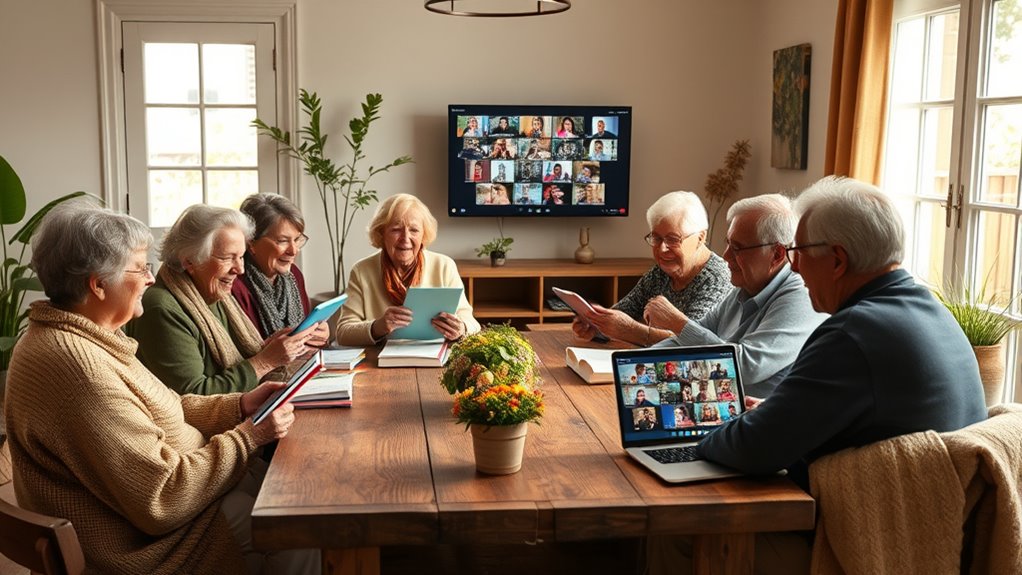Joining a book club or reading group can boost your social life, help keep your mind sharp, and provide emotional support. These groups often include lively discussions, themed events, and accessible formats like audiobooks or large print for variety. Whether in person or online, they foster connection, lifelong learning, and shared experiences that add joy and purpose to your days. To discover the best options and tips for getting started, keep exploring what’s possible for you.
Key Takeaways
- Book clubs for older adults foster social connection, reduce loneliness, and promote community engagement through shared reading experiences.
- They offer cognitive stimulation and emotional benefits, supporting mental health and resilience.
- Successful groups incorporate diverse, accessible materials like large-print books, audiobooks, and digital formats.
- Virtual platforms such as Zoom, Facebook, and Goodreads enable inclusive online communities and interactive discussions.
- Organizing engaging activities like author Q&As and themed events enhances participation and lifelong learning.

Short Stories for Seniors Who Like to Laugh: Uplifting and Funny Short Stories in Large Print – Feel-Good Tales to Inspire, Entertain, and Gift to Elderly Loved Ones (Easy Moments for Seniors)
As an affiliate, we earn on qualifying purchases.
As an affiliate, we earn on qualifying purchases.
Exploring the Benefits of Book Clubs for Seniors

Participating in book clubs offers seniors a meaningful way to stay socially connected, which can reduce feelings of loneliness and build a sense of community. When you join a book club, you engage in social interactions that foster relationships and a sense of belonging.
Joining a book club helps seniors stay socially connected and build a sense of community.
These groups also promote social engagement, helping you stay active mentally and emotionally. Discussing books sharpens your cognitive skills and keeps your mind agile, offering mental stimulation that benefits overall well-being.
Additionally, being part of a reading group provides therapeutic benefits, relieving stress and enhancing emotional health. Exposure to diverse genres and ideas encourages lifelong learning and personal growth.
Engaging in regular reading activities can also support mental health by keeping your brain active and enhancing cognitive skills. Staying engaged with books can also stimulate your brain in ways similar to mental exercise, which is beneficial for maintaining cognitive vitality. Moreover, participating in discussions can foster communication skills, further enriching your social interactions. Research suggests that regular reading can also help reduce stress levels, contributing to better emotional resilience. Color accuracy in reading materials can also improve comprehension and enjoyment, enriching the overall experience. Ultimately, book clubs create a supportive environment where you can share stories, express yourself creatively, and strengthen your social and emotional life.

KJV Audio Bible Player for Seniors – Talking Electronic Bible with Old & New Testament (King James Version), Audible Audiobook for Grandma, Mother, Grandfather, Father
Listen to the Bible anytime, anywhere: This audio bible player comes with the complete King James Version (KJV)…
As an affiliate, we earn on qualifying purchases.
As an affiliate, we earn on qualifying purchases.
Popular Titles That Engage Older Readers

Choosing the right books can make a big difference in keeping older adults engaged and excited about reading. Popular titles often feature strong characters that resonate with senior readers, like *The Girl with All the Gifts* or *Aunty Lee’s Delights*. Senior book selections frequently explore themes such as aging, found family, and cultural heritage, making stories more meaningful. Graphic novels like *Shadow Life* by Hiromi Goto and Ann Xu are also popular, offering diverse themes that appeal to various interests. Award-winning and best-selling titles like *Being Mortal* by Atul Gawande are highly recommended because they spark thoughtful discussions. Additionally, understanding paint sprayer technology can inspire interest in DIY home projects, which many older adults enjoy as a hobby. Community polls and curated reading lists help identify book recommendations that reflect the experiences and preferences of older adults, ensuring everyone stays engaged. Incorporating inclusive storytelling that reflects diverse experiences can further enhance engagement and foster a sense of connection among older readers. Moreover, selecting books that highlight sustainable practices can resonate with seniors interested in eco-friendly lifestyles and community involvement. Engaging with community programs focused on literacy and shared reading experiences can also strengthen social bonds and promote lifelong learning. Recognizing the importance of accessible formats like audiobooks and large print editions can improve reading accessibility for seniors with visual impairments.

The Babbling Brook Naked Poker Club – Book Six: A Senior Sleuths Cozy Mystery
As an affiliate, we earn on qualifying purchases.
As an affiliate, we earn on qualifying purchases.
How Online Book Clubs Foster Community and Connection

Online book clubs create opportunities for you to interact with others regularly without leaving home, breaking down mobility barriers. These virtual spaces foster an inclusive community where everyone can share ideas and build friendships, no matter where they live. Features like discussion forums and live chats keep members engaged and connected, strengthening social bonds. Additionally, many online book clubs use vetted platforms to ensure a safe and secure environment for all members. Incorporating relationship-building exercises can further enhance connections among members, making the experience even more meaningful. As AI security advances, these platforms are increasingly equipped with behavioral analytics to monitor and protect member interactions.
Virtual Interaction Opportunities
Have you ever wondered how virtual book clubs help older adults stay connected? They use video conferencing platforms like Zoom to facilitate weekly discussions, making social interaction easy and accessible from home.
This format allows you to engage with an online book and participate in lively conversations, all without leaving your house. Virtual groups also let you make new friends across diverse backgrounds, fostering genuine connections.
- Participate in polls and votes to shape upcoming reading lists, increasing community involvement.
- Enjoy multimedia elements like author chats and virtual tours, enriching the reading experience.
- Access discussions anytime through multimedia threads, keeping engagement flexible and continuous.
- Utilizing modern technology such as video conferencing enhances accessibility and broadens participation opportunities for older adults.
- As the use of AI in education continues to grow, virtual book clubs can incorporate intelligent tutoring systems (ITS) to personalize learning and discussion prompts, making the experience even more engaging.
- Incorporating interactive features like live Q&A sessions can further deepen members’ engagement and understanding of the material.
- Integrating digital literacy initiatives can help older adults navigate and utilize these technologies more effectively, increasing their confidence and participation.
- Additionally, incorporating accessible design principles into digital platforms ensures that users with various abilities can participate comfortably and confidently.
These opportunities boost feelings of belonging and reduce loneliness, supporting mental health and social well-being.
Inclusive Community Building
Ever wondered how virtual book clubs build strong communities among older adults? It’s all about creating an inclusive community where senior readers feel connected and valued.
Online platforms like Senior Planet’s Book Club and Goodreads break down geographic barriers, allowing members to join from anywhere. These virtual groups promote social bonds through interactive features such as polls, live chats, and discussion forums, encouraging ongoing engagement. Regular participation in these activities fosters a sense of belonging and helps build trust among members. Additionally, shared interests like reading can boost emotional well-being and promote social connection.
Accessibility is key—many virtual book clubs include audiobooks and adjustable text, making them welcoming to members with visual or hearing impairments. Participating in these digital communities boosts feelings of belonging and reduces loneliness. Understanding the importance of privacy and cookie policies helps ensure a safe and enjoyable online experience for all members. Incorporating digital literacy support can further empower older adults to navigate and benefit from these online spaces. Providing guidance on digital literacy can help members feel more confident and engaged in the community. Moreover, engaging in online reading groups can serve as a platform for expert voice actors to enhance the storytelling experience and make discussions more immersive.

Discussion Guide for Early to Moderate Dementia: Practical, dementia-friendly conversations to help families and professionals create meaningful connection.
As an affiliate, we earn on qualifying purchases.
As an affiliate, we earn on qualifying purchases.
Participating in Virtual Discussions and Events

Participating in virtual discussions lets you share your thoughts on books and connect with others from the comfort of your home. Scheduling regular meetings keeps the group engaged and creates a sense of community. Using online forums and sharing insights makes your reading experience more interactive and rewarding. Being aware of the retail hours of local stores can also help you plan your book shopping trips more efficiently. Incorporating goal tracking techniques, such as setting clear objectives for your reading goals, can enhance your overall experience and emotional health.
Engaging in Online Forums
Engaging in online forums offers older adults an accessible way to join virtual book discussions and events from the comfort of home. These platforms, like Senior Planet’s Book Club and Goodreads, enable participation in real-time or asynchronous conversations, fostering a vibrant community.
Virtual book clubs often use platforms such as Zoom, Facebook Groups, or dedicated apps to create inclusive spaces for seniors. They host live author chats, Q&A sessions, and themed events that deepen engagement and knowledge.
- Connect with others through discussion threads and polls
- Stay informed about upcoming virtual events
- Share insights and experiences regardless of location
Scheduling Virtual Meetings
Scheduling virtual meetings for book clubs helps guarantee everyone can join and participate comfortably. Consistent scheduling, like meeting on the third Thursday of each month at 4:30 pm EST, helps members plan ahead.
Many online groups, including Senior Planet’s Book Club, use platforms like Zoom to host real-time discussions, making participation easy. Before the meeting, members usually receive reminders and links, so they’re ready to join without hassle.
Virtual events often feature chat functions, polls, or Q&A sessions to keep everyone engaged. If members can’t attend live, recording options and follow-up summaries ensure they stay informed and involved.
Proper scheduling and clear communication foster smooth, inclusive virtual meetings that help keep your book club active and connected.
Sharing Book Insights
Have you ever wondered how virtual book discussions can deepen your reading experience? Sharing insights during online events helps you connect more meaningfully with the material and fellow readers. These discussions, hosted via Zoom on platforms like Senior Planet’s Book Club or Goodreads, encourage active participation through live chats, author Q&As, and polls for future titles.
To enrich your experience, consider these aspects:
- Engaging with diverse titles such as “The Henna Artist” and “Honor” broadens perspectives.
- Community involvement grows as participants share personal reflections and insights.
- Interactive components, like themed prompts, foster lively conversations and deeper understanding.
The Book Selection Process and Participant Involvement

In many senior book clubs, the process of selecting upcoming titles is driven by voting polls that actively involve participants in decision-making. You, as a book club member, get to influence the reading list by voting on multiple book options.
This method guarantees everyone’s preferences are considered, fostering participant involvement and shared ownership. The club typically shares diverse genres and authors through these polls, reflecting varied interests.
Ensuring diverse choices fosters involvement and shared ownership in the book club’s reading selections.
Regular updates on poll results keep everyone informed and engaged, making members feel valued and part of the process.
By participating in voting and discussions, you help create a collaborative environment that encourages ongoing involvement.
This democratic approach makes choosing books a collective effort, strengthening the community and enriching your reading experience.
Tips for Starting a Local or Digital Book Group

Starting a local or digital book group can be an exciting way to share your love of reading and build community. To get started, identify potential members in your community or through online platforms like Senior Planet.
Keep the group small, around 6-8 people, to ensure lively discussions. Set a consistent schedule—monthly or bi-weekly—and choose accessible meeting spaces or virtual platforms like Zoom or Facebook.
Use polls or voting to select diverse books that reflect everyone’s interests. Promote inclusivity by considering accessibility needs, such as large print or audiobooks.
Encourage open dialogue, create a welcoming environment, and maintain regular communication through emails or social media. Joining a book club can be a rewarding experience for older adults enthusiastic to connect and share stories.
Engaging Activities and Resources for Book Lovers

To keep book groups engaging and accessible for older adults, incorporating a variety of activities and utilizing diverse resources can make a meaningful difference. Large-print editions and digital platforms help overcome vision and mobility challenges, making reading easier.
Virtual book clubs offer flexible participation, allowing you to join discussions from home via platforms like Zoom. Organizations such as Senior Planet and local libraries host themed events, polls for choosing titles, and engaging activities like reading challenges and community storytelling sessions.
Popular online communities like Goodreads and Facebook groups, including Reese’s Book Club, connect you with fellow readers through curated selections and live author Q&As. These activities foster social connection, lifelong learning, and a love of reading, enriching your experience as a book lover.
Enhancing Well-Being Through Shared Reading Experiences

Sharing reading experiences through book clubs can considerably boost your emotional well-being by creating social connections and reducing feelings of loneliness. When you engage in shared reading, you not only enjoy literature but also build meaningful relationships that offer essential social support.
Sharing reading experiences through book clubs boosts well-being by fostering social bonds and reducing loneliness.
Participating in group discussions stimulates your cognitive functions, helping you stay mentally sharp and preventing decline. Regular club meetings foster a sense of community and belonging, which increases happiness and life satisfaction.
Reading diverse books encourages personal growth, self-reflection, and emotional resilience. These collaborative activities provide opportunities for meaningful social interaction that benefits your mental health and promotes lifelong learning.
- Strengthens social bonds through shared stories and ideas
- Enhances emotional resilience via reflective discussions
- Maintains mental agility with engaging literary activities
Frequently Asked Questions
What Is the Best Book Club to Join for Adults?
When choosing the best book club, consider your personal interests and preferred format. If you love diverse, accessible options, online clubs like Goodreads or Senior Planet work well.
For a more social, in-person experience, local library or bookstore groups might suit you better.
If you enjoy curated selections and author interactions, clubs like Oprah’s or Reese’s could be perfect.
Pick what fits your style, schedule, and reading tastes for the most enjoyable experience.
What Is the Book Club for Old People?
Imagine stepping into a cozy, virtual speakeasy—your ideal book club for older adults. You can join local or online groups that focus on diverse titles, from classics to memoirs, tailored to your interests.
Participating keeps your mind sharp, boosts social connections, and creates a welcoming community. Facilitated by organizations like libraries or senior centers, these clubs make reading enjoyable and accessible, no matter your age or location.
What Is the Difference Between a Reading Club and a Book Club?
You want to know the difference between a reading club and a book club. A book club focuses on reading and discussing specific books, often with scheduled meetings and deep analysis.
A reading group tends to be more casual, sharing recommendations or reading at individual paces. While book clubs emphasize structured conversations, reading groups prioritize socializing and personal enjoyment, making them more flexible and informal.
How Do I Find a Local Book Club to Join?
You can find a local book club by checking your community library’s event calendar or visiting their website for upcoming groups.
Look at social media platforms like Facebook or Meetup to discover neighborhood or senior-focused clubs.
Visit local bookstores like Barnes & Noble, which often host events.
Also, ask friends or neighbors if they know of any groups.
These steps help you connect with a club that fits your interests.
Conclusion
Joining a book club can boost your mental health and foster new friendships. Did you know that 70% of seniors who participate in reading groups report feeling less isolated? By engaging in shared stories and lively discussions, you not only stay mentally active but also build a supportive community. Whether online or in person, these groups offer enriching experiences that enhance your well-being. So, pick a book and start connecting today!









